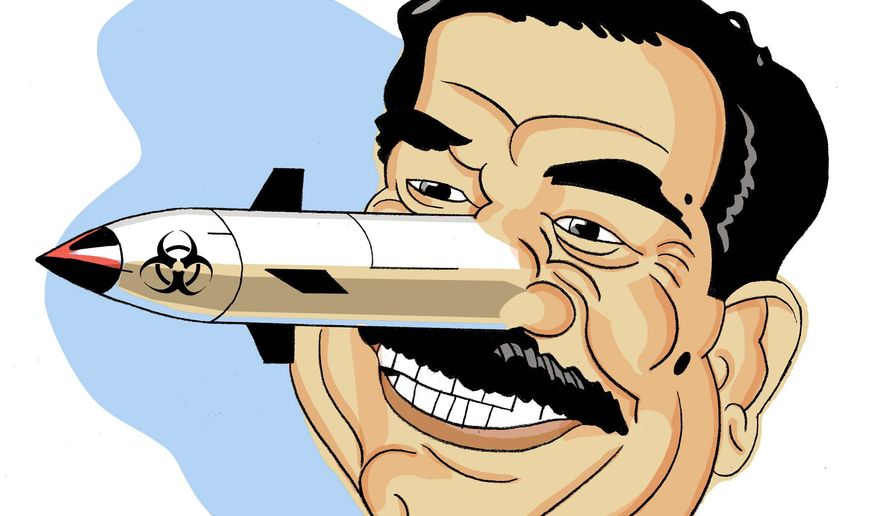OPINION:
Now that Donald Trump has resurfaced the issue of President Bush’s decision to invade Iraq, Saddam Hussein’s own words to the FBI are instructive.
In seven months of secret FBI debriefings after his capture, Saddam admitted that he faked having weapons of mass destruction when he was in power but had planned on developing a weapons of mass destruction program with nuclear capability within a year.
Saddam made the admissions in videotaped interviews with George L. Piro, an FBI agent who was assigned by the FBI with the CIA’s approval to try to develop the former dictator’s cooperation.
For my book “The Terrorist Watch: Inside the Desperate Race to the Next Attack,” Mr. Piro described the debriefings, which had never been previously revealed.
When the Arabic-speaking Piro arrived in Baghdad during the first week of 2004, he told me, he had no idea if Saddam would even say hello to him much less reveal his thinking about the invasion of Iraq, his role in ordering 300,000 people killed, and whether he had weapons of mass destruction. But Mr. Piro managed to develop Saddam’s trust.
Mr. Piro found that Saddam had a fondness for baby wipes, the disposable moist cloths used when changing a baby’s diaper. If Saddam had enough baby wipes, he would use them to clean food like apples before he ate them. Mr. Piro realized that, as a way of manipulating him, he could control how many baby wipes Saddam received.
Saddam confided to Mr. Piro why he had no weapons of mass destruction but pretended he did. Saddam said that because of the war of attrition he had with Iran, Iran always remained a threat to him. And if Iran thought he had serious WMD, it would be reluctant to engage him again. On the other hand, if he said he had them, Iran would never listen. But if the U.S. said that he had WMD, Iran would believe it.
So every time inspectors came, Saddam gave them the runaround, reinforcing for Iran’s consumption the notion that he had WMD. And that explains why, if there were no WMD, he acted as if he did have them.
Saddam aspired to develop a nuclear capability in an incremental fashion. Aided by his payoffs to key officials, he thought that sanctions would be lifted within a year or so. He figured he could then recreate Iraq’s WMD capability, which had been essentially destroyed in 1991.
“His goal was to have the sanctions lifted,” Mr. Piro told me after then FBI Director Robert S. Mueller III approved the interviews for the book. “And they likely would have been lifted if it were not for 9/11. Even the United Nations changed after 9/11. So Saddam was on the right track. His plan to have sanctions lifted was working. But he told me he recognized that he miscalculated the long-term effects of 9/11. And he miscalculated President Bush.”
Months before the invasion, Saddam came to realize that war was “inevitable,” Mr. Piro says. As a delaying tactic, he told Mr. Piro, he announced in September 2002 that he would allow weapons inspectors to return but stipulated that eight presidential compounds would be off limits.
Did Saddam ever consider coming clean with the United States and demonstrating that he did not have WMD?
“He didn’t give me the answer to that,” Mr. Piro says, “but I can tell you he wouldn’t have done that because that would have weakened him. He was given the opportunity to leave Iraq and go to live in Saudi Arabia and be very wealthy and very happy. The Saudis gave him the option. But what would that have done to his legacy? And if he were to have said ’I’m bluffing,’ or ’I’m not as strong as I present myself,’ where would he have then fit in the historical scheme of Iraq?”
Ironically, in view of anti-American feelings overseas and from within the United States over the invasion of Iraq, Saddam told Mr. Piro that he admired America and especially Americans.
When it was time to say goodbye, Mr. Piro bought two Cuban Cohiba cigars, Saddam’s favorite brand.
“We sat outside, smoked a couple of Cuban cigars, had some coffee, and chatted,” Mr. Piro says. They said goodbye in the traditional Arab manner: a handshake and then a kiss to the right cheek, a kiss to the left, and a kiss to the right again. That made Mr. Piro a little uncomfortable.
Saddam appeared shaken and became teary-eyed.
“When we were saying goodbye, he started to tear up,” Mr. Piro remembers.
The mainstream media have largely ignored Saddam’s admissions about faking WMD and his aspirations to pursue nuclear weapons. In an example of how inept Mr. Bush and Vice President Dick Cheney are at public relations, neither has referred to Saddam’s admissions in explaining the rationale for taking him out.
But given that Saddam realized he was about to be executed and had nothing to lose by being forthcoming, his admissions to the FBI help illuminate why Mr. Bush and the CIA were convinced that Saddam was indeed a threat.
• Ronald Kessler, a former Washington Post and Wall Street Journal investigative reporter, is the author of “The First Family Detail: Secret Service Agents Reveal the Hidden Lives of the Presidents” (Crown Forum).




Please read our comment policy before commenting.